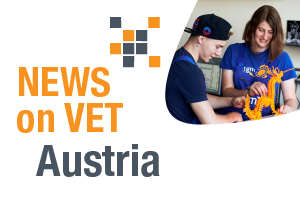By publishing the Just Transition Action Plan on training and reskilling in January 2023, the Austrian Federal Ministry for Climate Action (BMK) launched the implementation phase of the Just Transition process. With the involvement of numerous stakeholders from business and vocational education and training (VET), the goal is to put measures in place to meet the demand for skilled labour in the course of the green transformation by 2030.
The path towards the action plan on training and reskilling
At the end of 2020, the Just Transition Working Group on training and reskilling was established at the initiative of the BMK in cooperation with the Public Employment Service (AMS) and the Chamber of Labour (AK), and with the participation of the Ministry of Labour and Economy (BMAW). The working group aims to develop suitable measures to meet the demand for skilled labour because of the green transition.
A Just Transition Advisory Board was set up as an advisory and feedback body. It comprises representatives of numerous relevant stakeholders. Workshops, research and accompanying studies were used to develop the basis, ideas and proposals for measures for an action plan, which was presented in January 2023.
Currently, the focus of the working group is on the topic of energy transition and includes occupations and training in the areas of construction and renovation, renewable heat and renewable electricity. At a later stage, other topics such as mobility, circular economy or even social aspects will be included.
Thematic fields of the action plan
The action plan on training and re-skilling comprises four thematic fields, with three implementation phases: a short-term implementation horizon for 2023, a medium-term one (2023-24) and a long-term one (2025-30). Each thematic field is assigned a set of concrete actions with a definition of the implementation horizon as well as the institution responsible.
Thematic field 1: Education sector aims to identify new and additional required content and skills for ‘Just Transition occupations’ and integrate them into training programmes. This comprises both the inclusion of teaching content relevant to the climate in existing apprenticeship programmes, and the development of new reskilling as well as initial (IVET) and continuing vocational education and training (CVET) formats. The programme also includes promoting the continuing training of IVET trainers and investing in the technical infrastructure of part-time vocational schools and colleges of engineering, as well as developing new job profiles in the fields of electrical engineering and installation and building technology.
Thematic field 2: Companies, employees, jobseekers addresses the topic of advice, support and cooperation of labour market actors to identify in-company and supra-company IVET and CVET needs, and support providers in integrating green topics in their IVET and CVET programmes.
In thematic field 3: Framework conditions and compatibility, financial framework conditions are adapted and expanded through subsidies and other instruments. The field also aims to improve the identification of qualitative and quantitative needs and the accessibility of IVET and CVET programmes.
Thematic field 4: Communication relies on campaigns and disseminators to make the ‘Just Transition occupations’ and programmes comprehensible for the different target groups.
Gender and diversity perspective
In all thematic fields and measures, special focus is placed on addressing and setting topics that are appropriate for the target groups, and which particularly address girls, young women, people seeking retraining, unemployed people, people without a school-leaving qualification, socially disadvantaged people and people with disabilities. This also includes strengthening the gender and diversity competence of all actors and the work with role models.
Read more
- Just Transition action plan (German only)
| Please cite this news item as: ReferNet Austria; Cedefop (2023). ; Austria: greening VET - Just Transition Action Plan. National news on VET |

